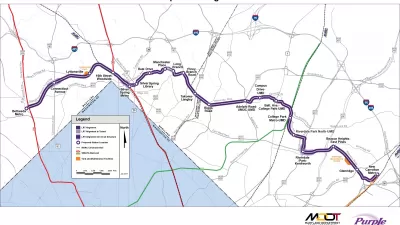To finance and construct a new $2.2 billion light rail line in the D.C. suburbs, Maryland will seek to enter into a unique private sector partnership. The ambitious strategy is drawing concern from lawmakers.
In this era of tight budgets and federal gridlock, cities and states are taking it upon themselves to find innovative ways to fund desirable infrastructure projects. Maryland is one of the states dipping its toes in the public-private partnership waters with a plan to design and build a 16-mile light rail line with the help of the private sector.
"Maryland transportation officials say such a partnership would take advantage of the private sector’s light-rail expertise and require the companies to assume the financial risks of any construction delays or cost overruns," explains Katherine Shaver. "The efficiencies gained from one private entity overseeing all aspects — from the drawing board to bulldozers to trains on tracks — are projected to save up to 20 percent over 35 years, officials say."
However, "[t]he approach, while considered innovative, is drawing scrutiny," she adds. "State Sen. Richard S. Madaleno Jr. (D-Montgomery), who reviewed the plan as a member of the Senate Budget and Taxation Committee, said he considers it a 'very risky proposition.'”
“It’s attractive. It’s an innovative approach,” Madaleno said. “But we don’t have very many, if any, examples of how this works out.”
UPDATE (10/16/13): The vote on whether to pursue the plan has been delayed until November 6.
FULL STORY: Purple Line: Public-private transit partnership would be one of the broadest in U.S.

Planetizen Federal Action Tracker
A weekly monitor of how Trump’s orders and actions are impacting planners and planning in America.

Maui's Vacation Rental Debate Turns Ugly
Verbal attacks, misinformation campaigns and fistfights plague a high-stakes debate to convert thousands of vacation rentals into long-term housing.

Cuomo Is the Candidate of Both NIMBYs and Developers. What Gives?
In the New York City mayoral race, odd bedfellows align to preserve the housing status quo.

San Antonio and Austin are Fusing Into one Massive Megaregion
The region spanning the two central Texas cities is growing fast, posing challenges for local infrastructure and water supplies.

Charlottesville Temporarily Has No Zoning Code
A judge ordered the Virginia city to throw out its newly revised zoning code, leaving permitting for new development in legal limbo.

In California Battle of Housing vs. Environment, Housing Just Won
A new state law significantly limits the power of CEQA, an environmental review law that served as a powerful tool for blocking new development.
Urban Design for Planners 1: Software Tools
This six-course series explores essential urban design concepts using open source software and equips planners with the tools they need to participate fully in the urban design process.
Planning for Universal Design
Learn the tools for implementing Universal Design in planning regulations.
Heyer Gruel & Associates PA
JM Goldson LLC
Custer County Colorado
City of Camden Redevelopment Agency
City of Astoria
Transportation Research & Education Center (TREC) at Portland State University
Jefferson Parish Government
Camden Redevelopment Agency
City of Claremont



























